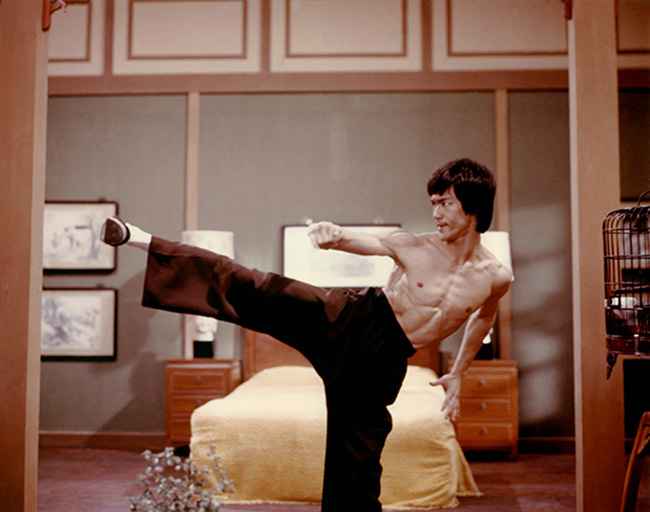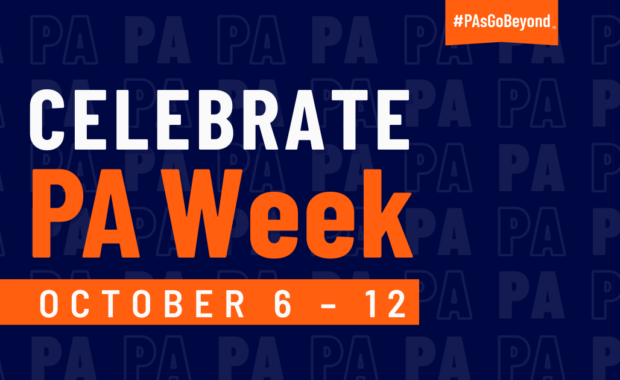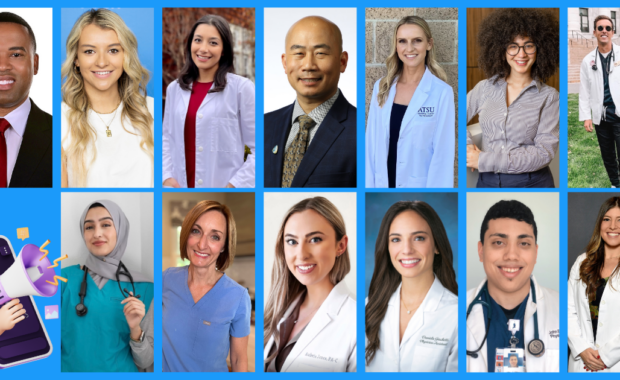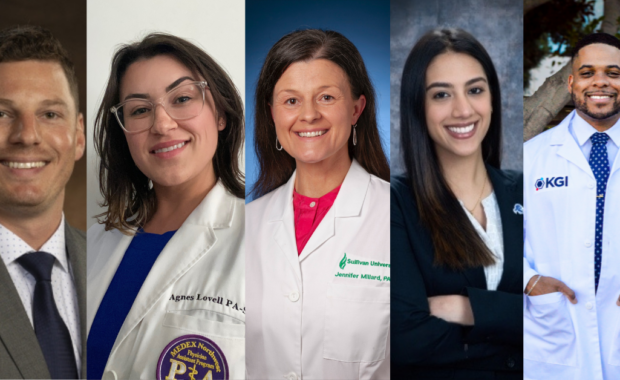What PA Students Can Learn From Bruce Lee – Seriously!
Martial Artist’s Inspiring Words Have Personal Impact
July 23, 2022
By Kristopher R. Maday, MS, PA-C, DFAAPA

Growing up in the ‘80s, I have always been quite partial to good old martial arts movies. (Don’t get me started on my boy, Jean Claude van Damme!) Martial arts movies tend to have similar messages about adversity, internal struggles against external forces, and triumph through brute force and a cunning wit. They’re very entertaining – and not dissimilar from the modern education process.
[Join now as an AAPA Student Member]
Every student is dealing with adversity, whether it is family, financial, personal, or something else. Students have internal motivation to study harder and longer, while the external forces of time management and non-school obligations swing back with equal vigor. Finally, after years of sacrifice in preparing for PA school, you are here and in your own person martial arts movie. Who else better to have as a mentor and personal motivation coach than Bruce Lee? Not only was Lee a legendary martial artist, but he was – and still is – regarded as a remarkable teacher. Even though Lee died early, at 33, in 1973, his words of wisdom still permeate teaching and academic circles. His words impart the importance of learning, and how to apply what you learn to be successful in life. Here are five of my most favorite Lee – or Lee-related – quotes and my perspective on what they have to do with medical education.
“Knowing is not enough; we must apply. Willing is not enough; we must do.”
I know this is officially attributed to 18th century philosopher Johann Wolfgang von Goethe, but I first heard it from Bruce Lee, so he gets the credit here. This is such a great philosophical aphorism for medical education. I can’t tell you how many times I have had students in my office showing me their notes, detailed drawings, color-coded schematics, and tell me emphatically ‘I know this stuff!’ My answer is always the same – you have to be able to critically process the individual pieces of information and apply it to a clinical scenario. Asking my students what the most common cause of “X” disease only tests regurgitation of memorized facts. Giving them a clinical vignette of a patient with “X” disease and asking them the most likely cause of this patient’s condition now tests their application and critical thinking. This is medicine. Every patient is different, and no two patients present the same. You have to be able to take the book knowledge you learn in didactics and apply them to patients.
The second part of the quote is also apropos to studying medicine in the sense that students need to “put rubber to road.” Often, I have struggling students ask what more they can do to help make information stick. When we sit down to discuss study habits, I have found they are trying to do too much at one time. My anecdotal experience tells me PA students are willing to try “everything,” except for focusing on what help the most. What that is depends on the student; it may be more repetition going over notes, small group discussions, listening to lectures, etc. Every student is different, but I have seen many beautifully designed study sheets, and then I find out that the students spent so much time designing their study sheets that they only had time to go over it once or twice before the exam. Willingness to study is not enough – you must still put in the work.
[Strategies to Manage Cognitive Load in PA School]
“Mistakes are always forgivable, if one has the courage to admit them.”
This quote really rings true during the clinical phase of training. The most underutilized statement in medicine is: “I don’t know.” It has the stigma of projecting incompetence and has historically been seen as a sign of weakness. The problem with that thinking is it puts patients at risk. In the growing wave of patient-centered care and shared decision making, telling a patient or your medical team “I don’t know” proves to them that you acknowledge your weaknesses and have insight into your cognitive deficits. Remember, though, “I don’t know” should always be followed up with “I will find out.” Answering a question from a patient or preceptor with a flippant “I don’t know” is never appropriate. Saying “I don’t know, but I will find out for you” allows you the opportunity to give the most up-to-date information that will better care for your patients.
Don’t forget the first quote here! Willingness to find out the information, but not following through with it, will not help anybody. If you say you will find out, do it. Even better, search with the patient in the room. I routinely look up medications or diagnoses with patients in the room to involve them in the decision making. I have patients tell me all the time how nice it was for me to take the time to show them pictures of conditions, or patient resources they can use at home.
Research has shown that, if a mistake does occur, physicians are less likely to get sued if they own their mistake to the patient1. This is the same for PA students and their preceptors. If you forgot to do something on your rotation, own it. We can sniff out students who are lying! If you own your mistake up front, apologize, and then tell us how you are going to fix it, we will probably tell you that this is a learning experience and how you can apply this going forward. Much better than getting yelled at, right?
“Life itself is your teacher, and you are in a state of constant learning.”
Medicine is very different from many other professions in the sense that the ways we manage disease can change overnight. One study can, and many times has, proven that how we have been treating a disease for years is wrong. If you think that as soon as you get out of PA school your studying is over, you are sorely mistaken. In fact, I studied more often and harder after I got my first job as a PA in a trauma/burn intensive care unit than I did in the weeks preceding my boards. Now it was real. Now what I knew actually mattered to patients – not professors. This scared me more than any other test I have ever taken. The nice thing about that though was the more experience I got working, the easier it was to apply the literature. Once you make the realization that you will never stop learning in medicine, the easier it is and the more desire you have to learn more than you knew the day before.
[PA Students: Enhance Your Study Strategy to Maximize Learning]
“A good teacher can never be fixed in a routine. Each moment requires a sensitive mind that is constantly changing and constantly adapting. A teacher must never impose his student to fit his favorite pattern. A good teacher protects his pupils from his own influence. A teacher is never a giver of truth; he is a guide, a pointer to the truth that each student must find for himself. I am not teaching you anything, I just help you to explore yourself.”

I tell my students that I don’t think of myself as the traditional “Sage on the Stage,” but more of a “Guide on the Side.” My job in teaching clinical medicine is to not only provide the basic information on the NCCPA blueprint topics, but also how PA students can find information during their clinical year and beyond. One of my contract statements with my students is if they find something that is out of date (or wrong), they have the ability to tell me so I can fix it. Medicine changes so frequently that things I taught five years ago have changed and I may have missed the updates and failed to adjust my presentations. By telling them this, I involve them in the learning process and give them ownership in their education. I am very active on social media and send out links to articles, blog posts, consensus statements, podcasts, etc. to show them how easy it is try to stay up to date on the growing bodies of literature in medicine. My hope, I explain to them, is that they can start to create their own personal learning networks and by beginning this in their didactic phase of education, it will be that much easier for them during the clinical year and clinical practice. I have even gone away from requiring textbooks and have them only use education services (we use Up To Date©) as their reference for the lecture material. This way, I have guided them to learn how to use this quickly and efficiently to improve their clinical experience and I know that this material is as current as possible.
[Student Member Benefit: Save 50% on Up to Date Subscription]
“Memorizing and regurgitating Bruce Lee’s words does not increase one’s intelligence. However, adapting his thoughts for one’s own actions gives life to his words.”
This quote is not from Bruce Lee, but from Linda Lee Cadwell, his wife. Quickly being able to recite famous quotes is a great parlor trick and can often give the impression of intelligence. Being able to take the message of teachings or writings and apply them to your everyday life, professional ethos, or personal philosophy, is the true sign of the cogent intellectual. I have personally tried to incorporate these ideas into my teaching strategies and day-to-day interactions with my students, and my goal is that they see this and start to apply them in their own practice. I tell my PA students year after year: “If one thing I teach you helps a patient, then everything I do is worth it.” I think Mr. Lee would feel the same way.
References
- Robbennolt JK. Apologies and medical error. Clin Orthop Relat Res. 2009;467(2):376-382. doi:10.1007/s11999-008-0580-1
Kristopher R. Maday, MS, PA-C, DFAAPA is Associate Professor and Program Director in the PA Program at the University of Tennessee Health Science Center in Memphis, Tennessee. Contact him at [email protected]. Follow him on Twitter @PA_Maday.
Editor’s note: This article originally appeared in October 2020.
You May Also Like
PA Students: Enhance Your Study Strategy to Maximize Learning
How to Stay on Track in PA School During a Global Pandemic
The Ups and Downs of My First Year as a PA
Thank you for reading AAPA’s News Central
You have 2 articles left this month. Create a free account to read more stories, or become a member for more access to exclusive benefits! Already have an account? Log in.



